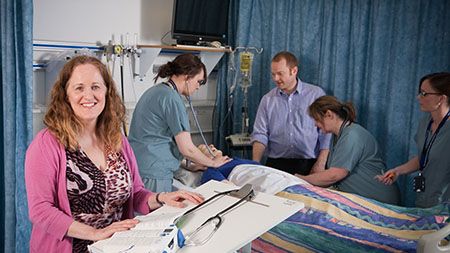
Press release -
New breed of medical graduate helping critical care units cope
In 2009 Newcastle Hospitals NHS Foundation Trust identified the need to develop a new kind of medical professional to support medical staffing of intensive care units in response to variations in recruitment, retention patterns of medical staff and working time regulations. Newcastle Hospitals partnered with Northumbria University to develop a programme that would take a select group of existing health care professionals and support them to be fit for purpose using a curriculum based on medical, rather than health care education, creating the role of an Advanced Critical Care Practitioner (ACCP).
Sixteen health care professionals, mainly nurses and physiotherapists, have completed the ACCP training programme since the course launched in 2010 and they are now having a positive impact working in critical care units in three NHS Trust’s hospitals.
Sadie Diamond-Fox, a former Nurse who is now an ACCP in Newcastle upon Tyne NHS Trust, studied with the second cohort of students at Northumbria University and Newcastle Hospitals and has embraced this new step in her career.
“This is a completely new career opportunity in health care,” she said. “Classically the nursing progression framework has tended to include only managerial or teaching posts. The role of an ACCP is unique in that it incorporates clinical time, teaching, research and managerial opportunities, allowing each ACCP to develop their role dependant of service requirements of the particular unit to which they are ‘attached’.
“I would urge any health care professional who is considering applying to join us as ACCP’s and spend some time shadowing us in our clinical areas so you get a feel for what it’s like to do the job day-to-day.”
Sheila McQueen, Head of the Public Health & Wellbeing Department, who co-authored the framework for ACCP’s said: “The ACCP’s role, which is similar to a physician’s assistant, was totally new when we started in 2010 and the programme has adapted and evolved over the first couple of years.
“The course is delivered as a 70% clinical based programme where competence is assessed by senior medical consultants in intensive care units and is competency based so Masters graduates come out work-force ready for their new role. They can then build on the Post Graduate Diploma in Clinical Practice once they have worked and consolidated practice to a full Masters in Clinical Practice.
“We are very proud of the positive impact the ACCP’s are having, and other trusts including Northumbria and Carlisle are now working with Northumbria University to prepare ACCPs for the medical workforce, following the successful feedback from the first programme delivered in Newcastle Hospitals.”
Newcastle Hospitals was one of the first UK trusts to go down this route for workforce development and currently has the largest cohort of ACCP’s working and training for the Trust.
Dr Phil Laws, Consultant in Intensive Care Medicine & Anaesthesia at the Royal Victoria Infirmary, played a big part in introducing ACCP’s to the Trust. He commented: “It was a big decision choosing how many employees we should put forward for the ACCP training programme because we lose candidates’ service delivery while they study full-time for two years but we needed to do something because our intensive care work force was stretched and we had to find a solution.
“Originally we were employing trainee doctors from other countries and visa limits resulted in challenges maintaining staffing levels. This was a UK-wide problem, which we are now solving in Newcastle with ACCP’s.
“The ACCP’s have been accepted on all sides and have come into their own when showing new medical staff the ropes on the intensive care unit. Their performance levels are comparable to junior doctors, which is what we were aiming for, and they are now an extremely valuable asset to our team.
The new programme has been of mutual benefit to students and hospitals alike, which former Nurse Sadie testifies to. “It’s the best career decision I’ve ever made but its hard work,” she said. “Managing the transition from my original background as a nurse to being part of the medical team was a challenge – you have to find your place in the team as this new entity. It is however one of the most rewarding jobs I have had the privilege of doing, I’m very excited for the future.”
Northumbria University has been voted the UK’s Nurse Education Provider of the Year (Post-Registration) at the Student Nursing Times Awards for three years running.
For more information on CPD programmes for health care professionals visit www.northumbria.ac.uk/cpd
Categories
Northumbria is a research-rich, business-focussed, professional university with a global reputation for academic excellence. To find out more about our courses go towww.northumbria.ac.uk
If you have a media enquiry please contact our Media and Communications team at media.communications@northumbria.ac.uk or call 0191 227 4571.






